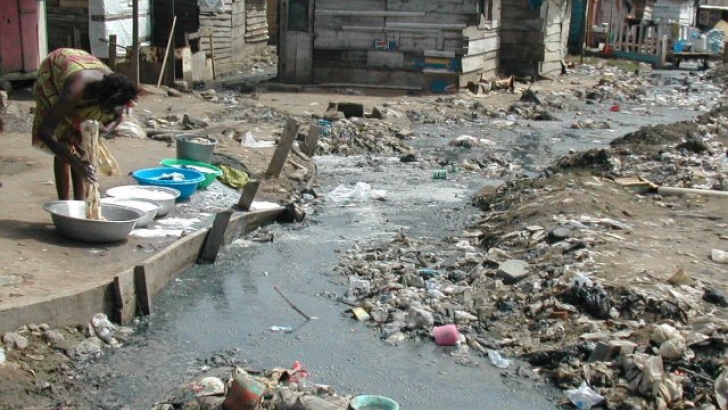
Sanitation Days in Ghana are well-intentioned events. However, lately they have sadly become obscene public spectacles where starched government bureaucrats and regional political chieftains strap on Wellington boots, don fatigues and with shovels in hand lead groups of clearly disinterested citizens to clean shoddily constructed drainage systems of mounds of waste.
Sanitation Days are a tacit acknowledgment that as a nation we pay less attention to our immediate surroundings. Sanitation Days are, in fact an indictment of our sanitary habits; it is not out of place to assert that Ghanaians are not scrupulously clean. Is it true that we don’t particularly care if we live next. to mountains of household waste and other discarded debris? So long as the waste does not disrupt our daily routines, we avert our eyes from the filth and go on living.
Our cities and towns are dens of filth; gutters are clogged with putrid waste, human and all. Streets are littered with the flotsam and jetsam of everyday life….used plastic bags and food and candy wrappers. Accra, the nation's capital has earned the dubious distinction of being the most smelly and unkempt metropolis. Just stroll down the streets of the main business center, Makola and UTC, and the wrenching smell can be overpowering. Tamale in contrast, is a clean city. I am not embellishing this story because I hail from Tamale. Visitors to both Accra and Tamale will readily testify to this fact.
First-time visitors to the capital city hold their noses in plain disgust at the pungent smell. This rather embarrassing fact was accentuated years ago when an American contestant in a gruelling competition dubbed the “Amazing Race” clasped his hand to his nose and yelled out in disgust, “This place stinks” as the competitors drove through the streets of the city.
Ghana’s sanitary challenges aren’t new. They have been around for years and governments past and present have grappled with finding solutions to no avail. Some of us tend to blame the British for bequeathing us with political and education systems, but not leaving us with a national underground drainage system that would have relieved much of the burden we are saddled with today.
Rapid urbanization and population explosion in recent years have adversely affected cities, creating huge problems for city planners. And to make matters worse, citizens just don’t seem to grasp the importance of keeping their environment clean, if anything at all, for health purposes. A recent outbreak of cholera in Accra which killed scores of people was attributed to dirty environs.
Sanitation problems will persist if there isn’t a total attitudinal change among Ghanaians. But a change in attitude hinges much on what the government will do. It can help by constructing waste deposit and recycling centers in the major cities and towns and pay lucrative salaries to those employed to haul our waste to these centers.
Zoomlion the garbage collection entity, began its work zealously some years ago, but since there is no competitor to give it a run for its money, it has slacked off. So, it is incumbent on us to spruce up our cities, towns and villages without counting on private or public entities. We can first begin by keeping our homes clean and discarding our waste at designated depository places.
Towards this end, we can take a cue from some of the nation’s institutions. When you talk of cleanliness, the Ghana Army immediately comes to mind. It has long established a reputation as a bastion of cleanliness. Visit a barracks and the spotlessly clean buildings housing soldiers will take your breath away. I vividly recall growing up in the now defunct Uddara Barracks in Kumasi and witnessing first-hand the work and effort that went into keeping the place clean.
Women, who were the wives of soldiers, organized themselves into groups with leaders who went around the barracks at dawn waking up and summoning other women to to their responsibilities of cleaning the bathrooms and sweeping the barracks grounds. To complement the efforts of the women, there were waste haulage vehicles popularly known as bola bola lorries which drove around the barracks carting away household garbage deposited in designated places.
Ghanaians don’t require a nudge from authorities to keep the environment clean; it should be instinctive and it should be in our DNA. Cleanliness must be a paramount concern of ours. It speaks volumes about our character and reputation. A nation that is perceived as dirty and unhealthy does irreparable damage to its image.
Categories:


